Christmas Spirit Index

The most festive time of the year brings loved ones together to celebrate, relax and have a good time. As December nears, people start anticipating the month's festivities as they decorate their Christmas trees and adorn them with Christmas decorations, ready for the big day.
The joy of Christmas is often celebrated by the coming together of families and friends to eat, drink, and share gifts. For most children, Christmas is known by the anticipation of Santa’s visit to their homes. A popular tradition that children look forward to is Father Christmas (or Santa Claus as he is often known) coming down the chimney to deliver Christmas presents hand-built by his elves and transported on his flying reindeer-towed sleigh.
Of course, as most people grow older, they stop believing in the fantastical tale as the truth is revealed to them. But where do most people still believe in Santa’s existence? By looking at Google search data from countries across the globe, as well as in the UK and US, we have been able to determine those who still believe in the magic of Santa the most.
Countries around the world that believe in Santa the most
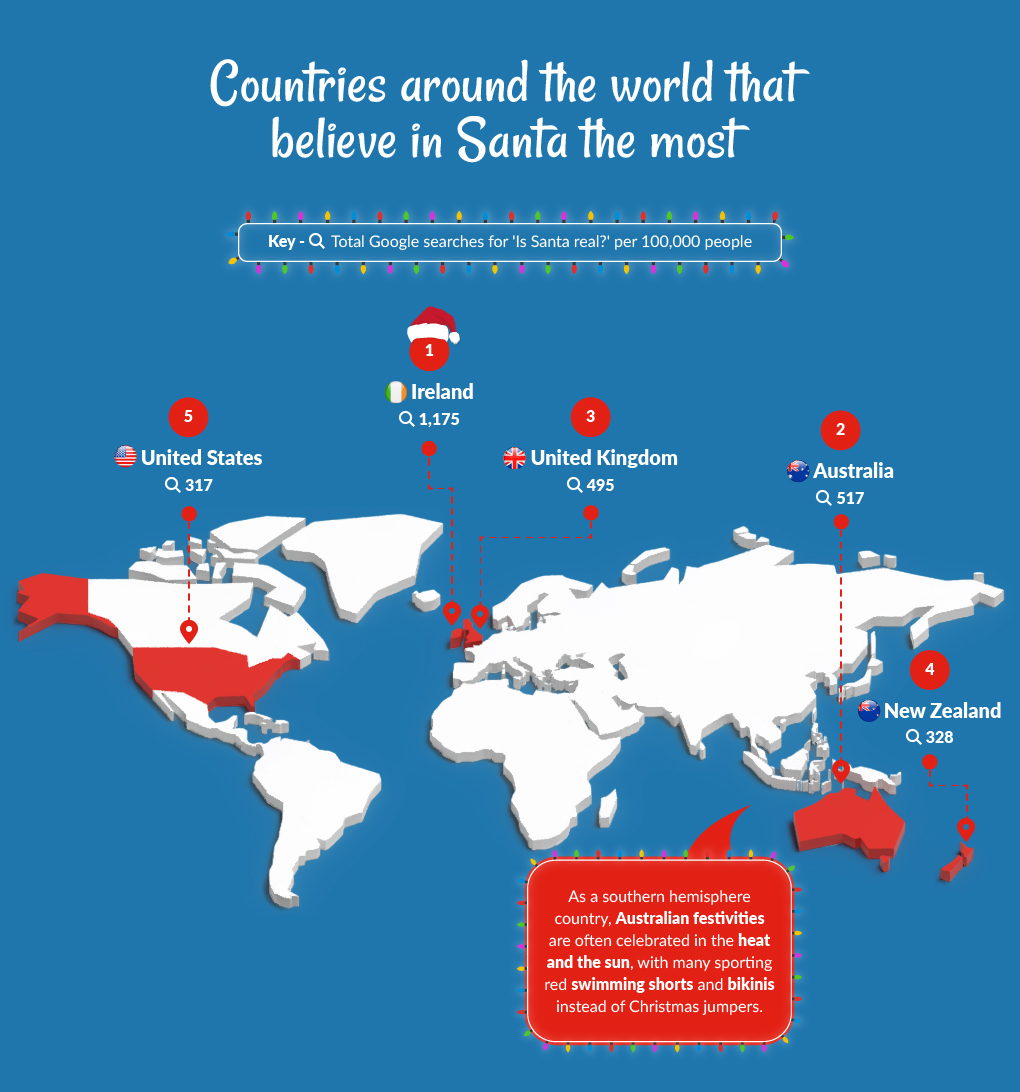
1. Ireland - 1,175 Google searches per 100,000 people:
Ireland is the country that still believes in Santa the most; there was almost double the amount of searches per 100,000 people here than in any other country. Christmas is a magical time in Ireland, with large Christmas markets in the major cities and festive illuminations lighting up its most famous attractions. There is also a connection between Ireland’s iconic drink Guinness and Santa Claus. He featured in a famous Christmas edition of the ‘Guinness for Strength’ advertising campaign, and more recently, his image has been etched into the froth on the top of a pint.
2. Australia - 517 Google searches per 100,000 people:
As a southern hemisphere country, Australian festivities are often celebrated in the heat and the sun, with many sporting red swimming shorts and bikinis instead of Christmas jumpers. However, the magical Santa appears in his usual garb, and Australians have a strong belief in him and the magic of Christmas. There were over 500 searches per 100,000 people, making Australia the Christmas capital of the southern hemisphere. It is lucky that Aussies believe in Santa’s magic, as it would take him 34 hours to fly from near the North Pole to Sydney commercially.
3. United Kingdom - 495 Google searches per 100,000 people:
There were just under 500 Google searches per 100,000 people in the UK, as it ranked third for nations believing in Santa Claus. Traditions for children surrounding Father Christmas in the UK include leaving sacks and stockings out for him to fill with presents and providing biscuits and a glass of his (and conveniently, your parents) favourite alcoholic drink to keep his energy up as he flies around the world.
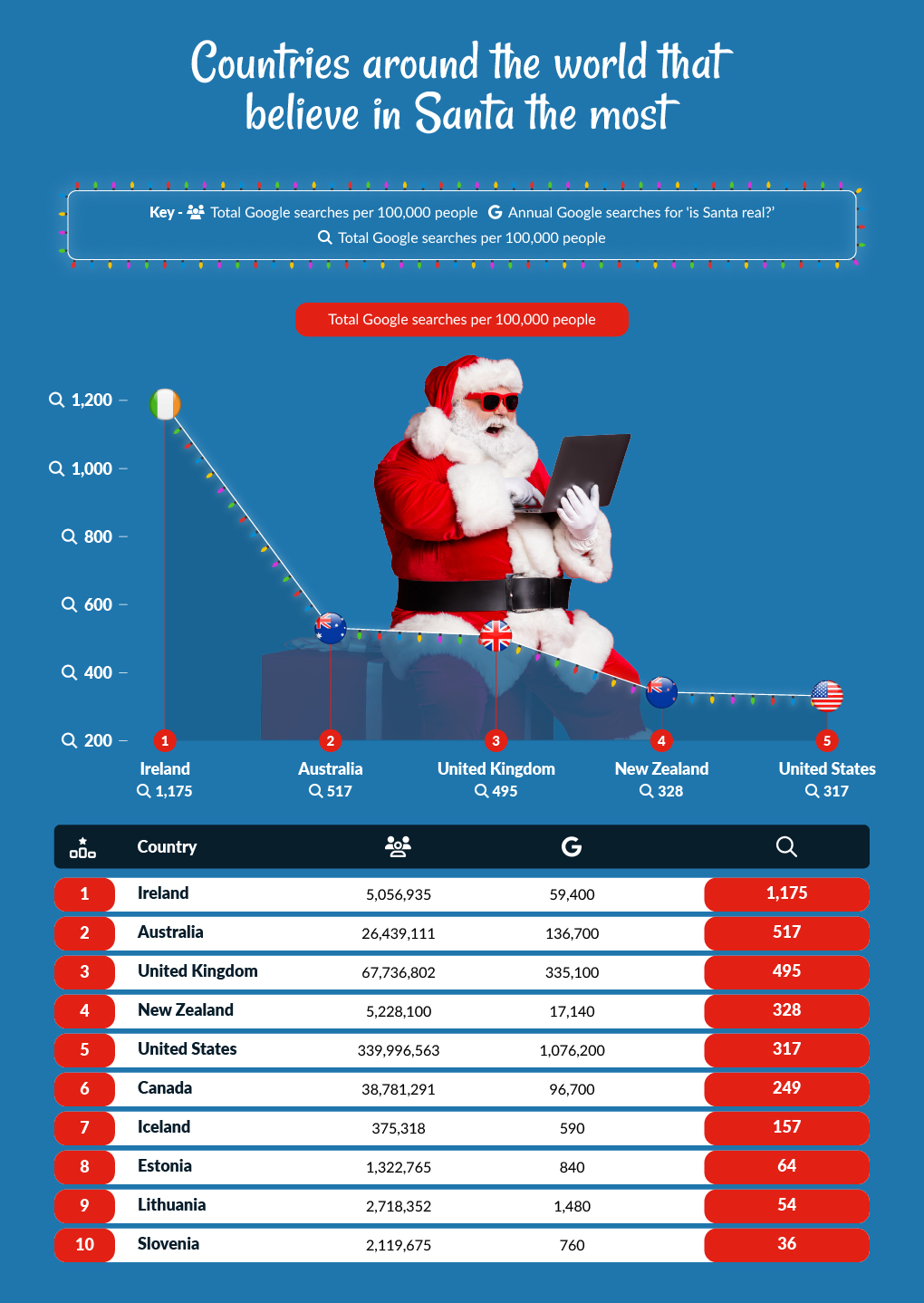
UK cities that believe in Santa the most
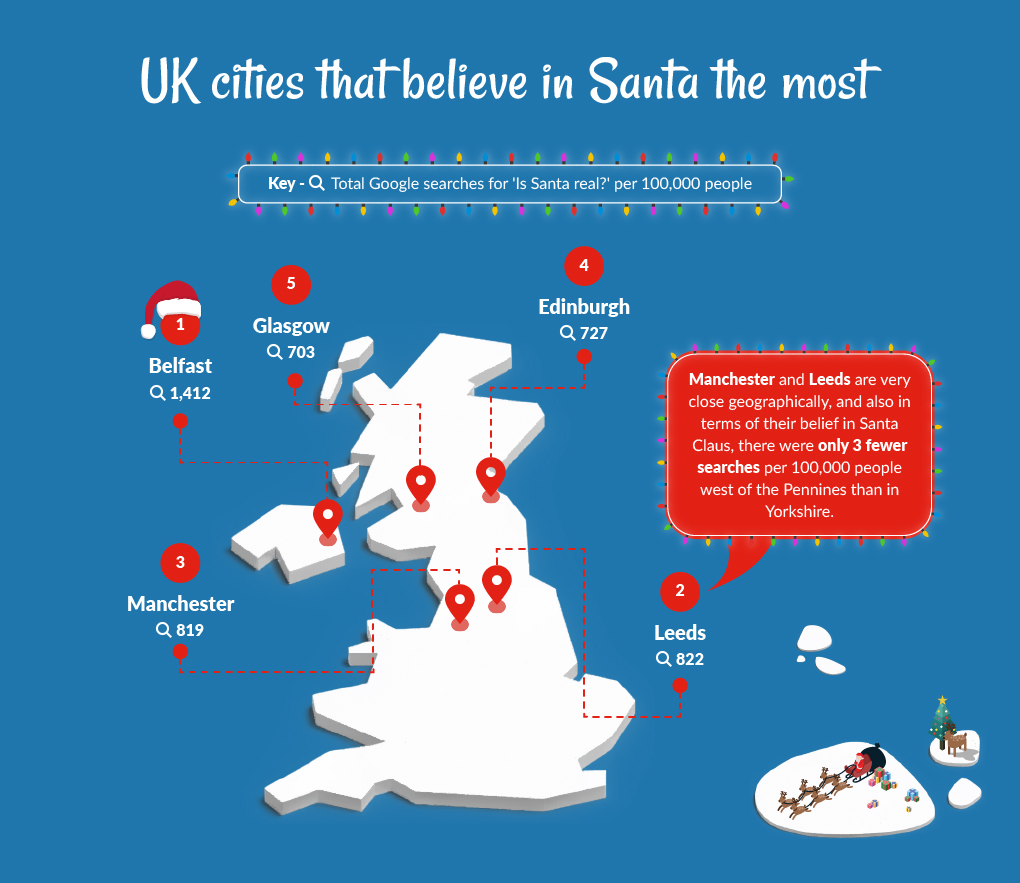
1. Belfast - 1,412 Google searches per 100,000 people:
Belfast is the Christmas capital of the UK, with almost 1,500 Google searches per 100,000 people relating to their belief in Santa. Belfast has many big Christmas traditions, such as the festival in City Hall Gardens and its continental Christmas markets.
2. Leeds - 822 Google searches per 100,000 people:
Leeds is the English city with the biggest belief in the magic of Santa and Christmas and the second highest in the UK after Belfast. There are many things to do at Christmas in Leeds with the Christmas markets, Christmas shopping and shows in the theatre; almost all of these attractions feature Santa Claus, and as such, there is a lot of belief in the magical man from the people of Leeds.
3. Manchester - 819 Google searches per 100,000 people:
Manchester and Leeds are very close geographically, and also in terms of their belief in Santa Claus, there were only 3 fewer searches per 100,000 people west of the Pennines than in Yorkshire. Manchester is famous for its German Christmas markets in the city centre which attract visitors from near and afar and help bring Christmas magic to the Mancunians.
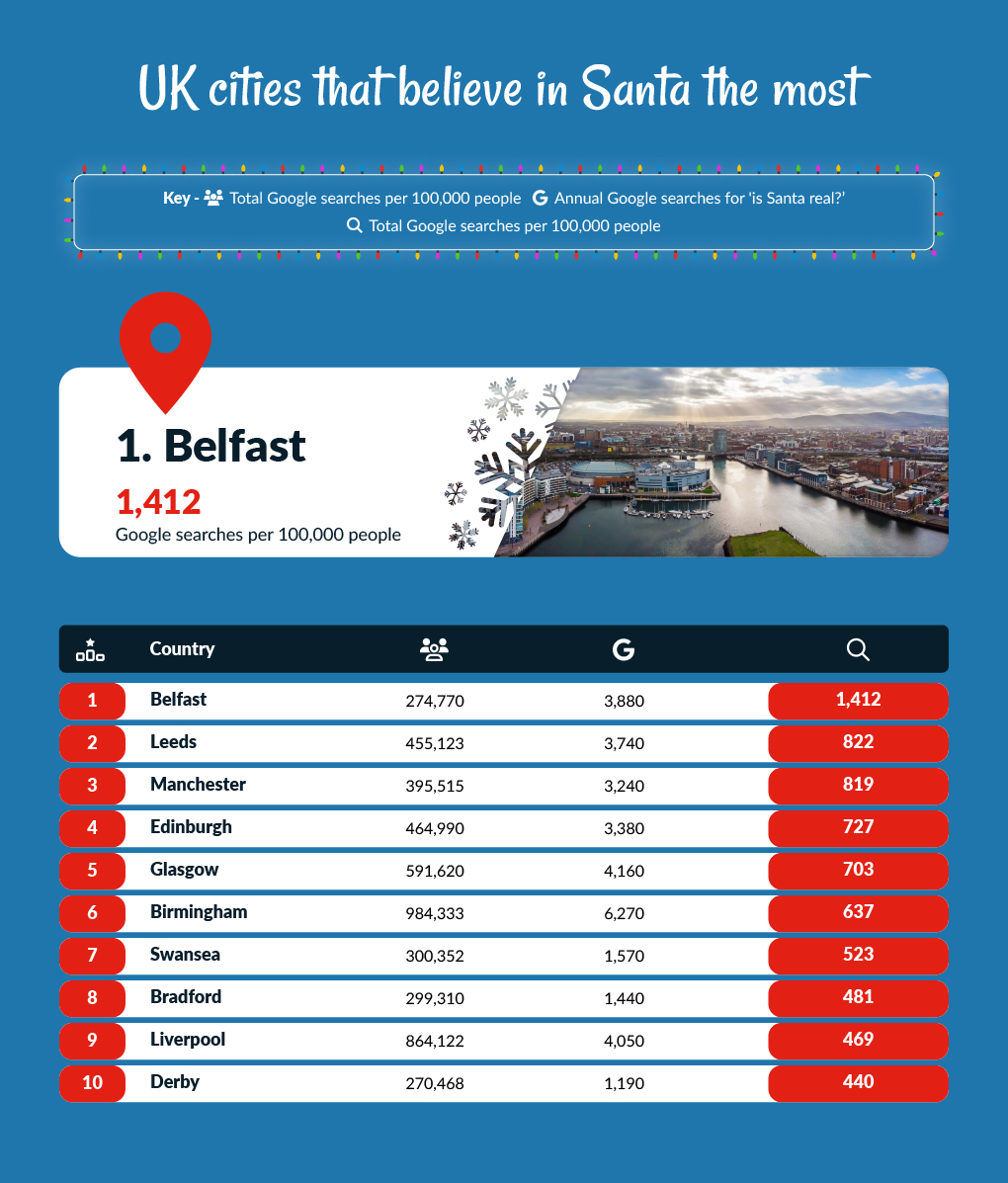
US states that believe in Santa the most
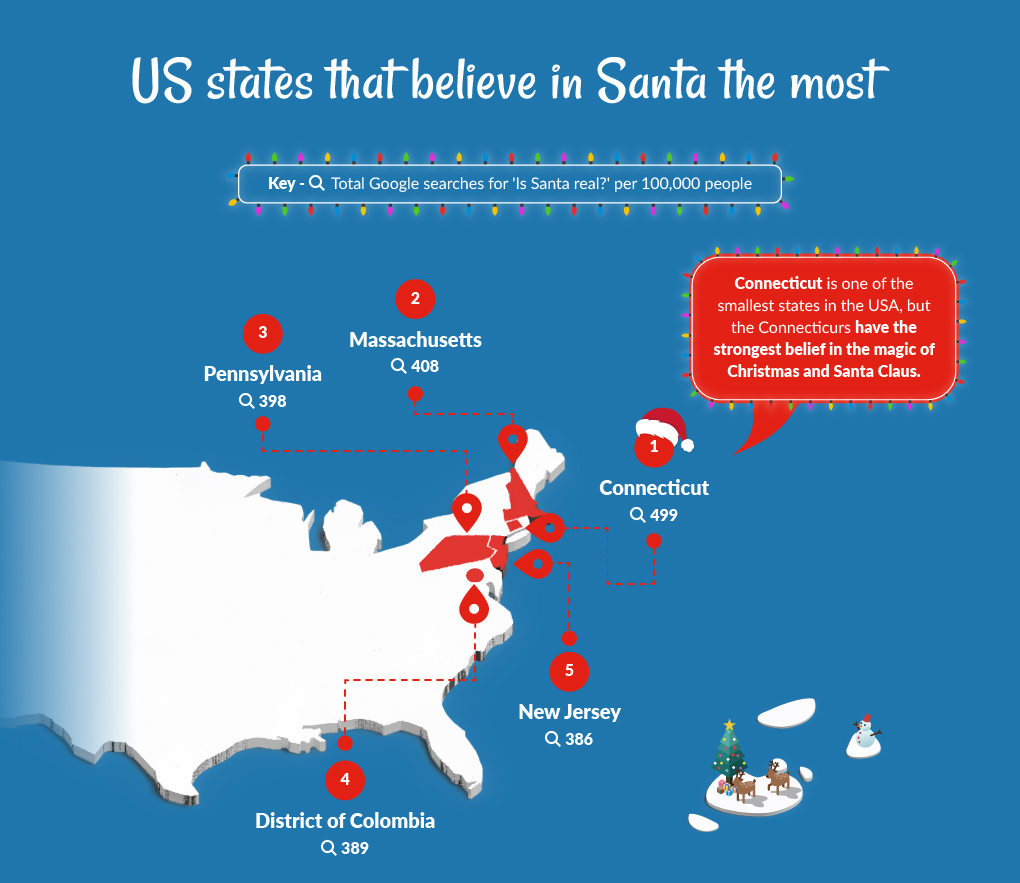
1. Connecticut - 498 Google searches per 100,000 people:
Connecticut is one of the smallest states in the USA, but the Connecticurs have the strongest belief in the magic of Christmas and Santa Claus. Connecticut has many magical activities for all the family in December, including the reindeer Festival at Greenwich and Santa’s workshop at Wickham’s Park. This abundance of Christmas activities has rubbed off on the locals, as there were almost 500 searches per 100,000 people.
2. Massachusetts - 408 Google searches per 100,000 people:
Christmas in Massachusetts is a massive festivity, perhaps driven by the state's and Ireland's link. It is estimated that over 4.5 million Irish men and women emigrated to America between 1820 and 1930, with many settling in Massachusetts and neighbouring eastern states. Boston (the largest city in the state) has many magical festive attractions, such as ice skating at the Frog Pond, the state is also home to the ‘Christmas City’.
3. Pennsylvania - 398 Google searches per 100,000 people:
Pennsylvania is the US state with the third highest belief in Santa Claus and the magic of Christmas. There were almost 398 Google searches per 100,000 people in Pennsylvania, exactly 100 fewer than in Connecticut. Although Bethlehem, where Jesus was born, is located in the Middle East, there is a Bethlehem, Pennsylvania, which hosts a massive annual Christmas market.
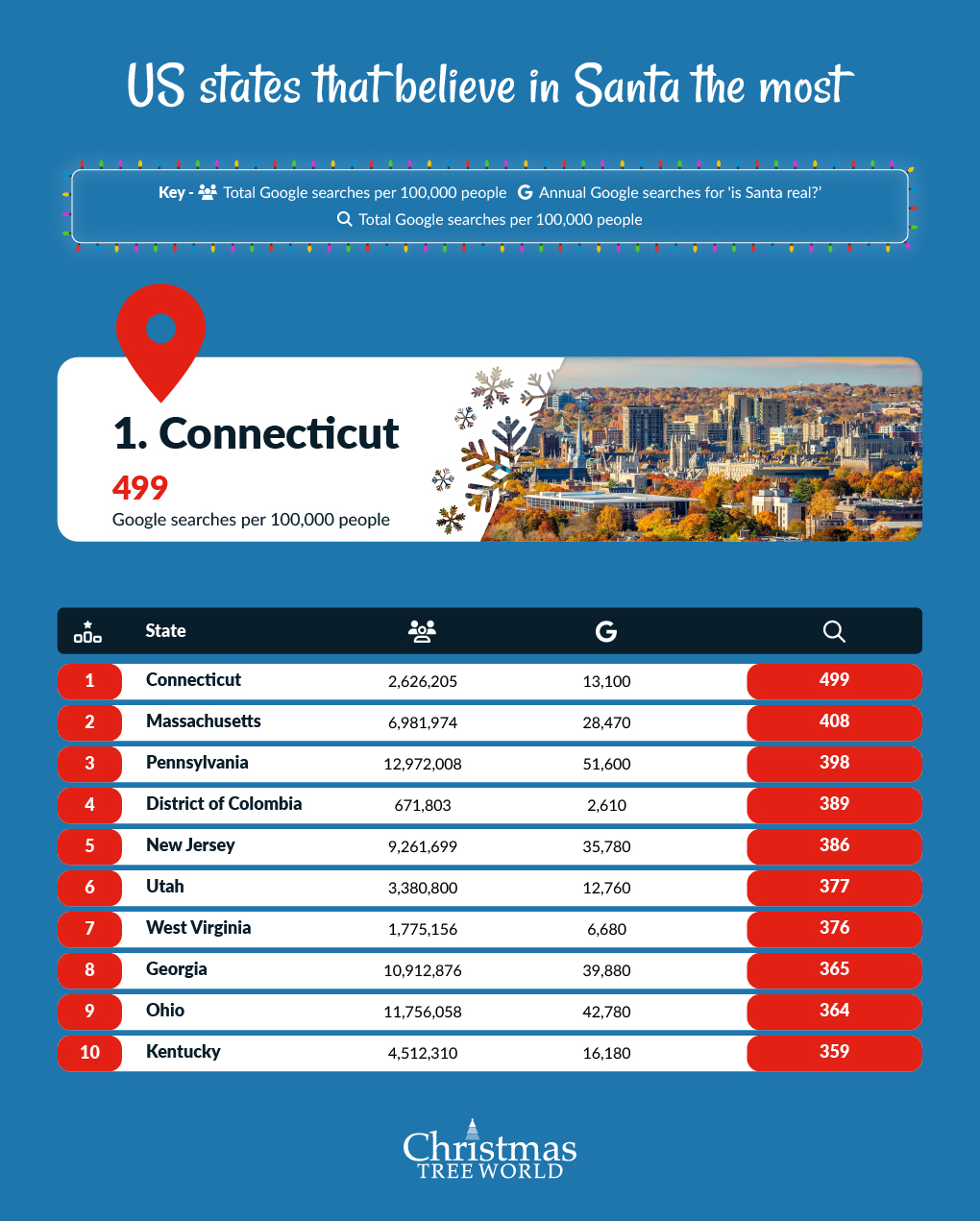
Methodology
-
We used only OECD member countries in the study (countries that do not celebrate Christmas were removed).
-
In the US, we studied every state.
-
In the UK, we looked at the 25 most popular towns and cities.
-
Populations were sourced from worldometers for countries, geonames for the UK and census data for the US.
-
Google Keyword Planner was used to find the total number of searches for the question ‘is Santa real?’ in each area between September 2022 and August 2023.
-
We took the total number of searches and then calculated the total number of searches per 100,000 people.








